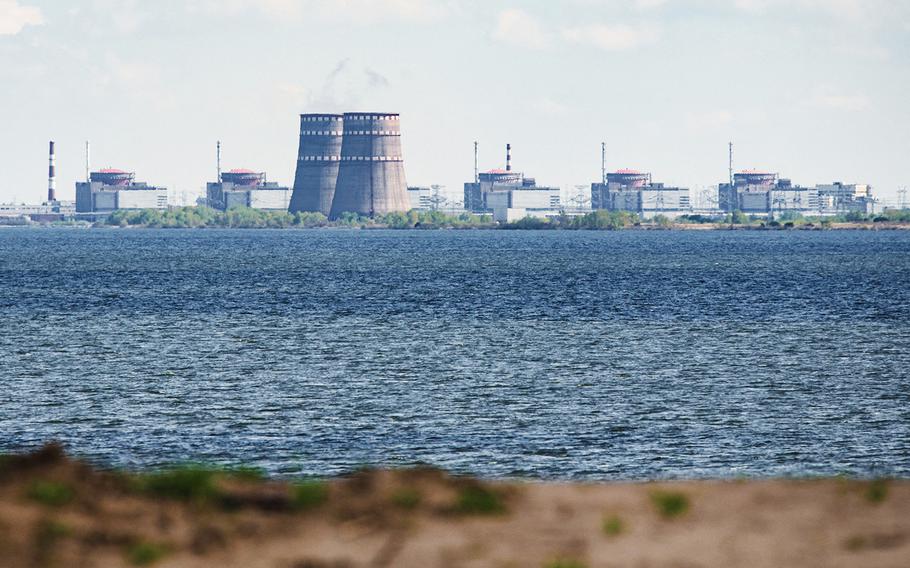
A view shows the Zaporizhzhia nuclear power plant, situated in the Russian-controlled area of Enerhodar, seen from Nikopol in April 27, 2022. (Ed Jones/AFP)
(Tribune News Service) — Russia’s plunder of the biggest nuclear power plant in Europe risks undercutting efforts to establish a security zone around the reactors and has narrowed the room for diplomacy with international monitors, according to analysts.
International Atomic Energy Agency Director General Rafael Mariano Grossi met Russian President Vladimir Putin on Tuesday in St. Petersburg to discuss nuclear safety concerns around the Zaporizhzhia Nuclear Power Plant, according to the Kremlin.
Russia claimed ownership over the plant — home to six reactors built to supply a fifth of Ukraine’s electricity — last week as part of a wider “annexation” of occupied territory in Ukraine in a move condemned by the United Nations. Moscow also told the plant’s Ukrainian staff to reapply with Russian state-owned atomic energy company Rosatom to keep their jobs.
The theft of the site is complicating IAEA talks to create a safety zone around the plant after repeated attacks cut power and water supplies, forcing the reactors to shut down.
“The risk is that if the IAEA makes a deal with Russia that enables improvement of security and safety around the plant, the agency could appear to be legitimizing Russian claims of sovereignty over the territory,” said the Berlin-based Carnegie Endowment for International Peace analysts Mark Hibbs.
Grossi has been shuttling between European capitals in an attempt to advance his agency’s proposed security zone around the Zaporizhzhia Nuclear Power Plant, known as ZNPP.
Putin told Grossi that Russia is “open to dialog” and seeks to tone down “dangerous” nuclear rhetoric, according to the Kremlin.
“A protection zone must be established,” Grossi said in a statement. “We can’t afford to lose any more time. We must do everything in our power to help ensure that a nuclear accident does not happen during this tragic conflict, as it could cause even more hardship and suffering in Ukraine and beyond.”
Russian forces captured the plant during the first week of the war and have been there ever since. Attacks against the station have increased since July, with both sides blaming each other.
“He’s right asking both sides to exercise restraint,” said Tariq Rauf, a former policy director at the agency. But ultimately nuclear safety and security are the sole responsibility of states, and the IAEA’s rulebook doesn’t give Grossi the power to impose a demilitarized area around the plant, he said.
IAEA guidelines recommend a 30-kilometer (18.6-mile) perimeter to separate military activities from nuclear power plants in times of peace. But with modern rockets and artillery capable of hitting targets potentially much farther away, those standards are insufficient in the context of Ukraine, Rauf said.
Ukraine’s nuclear utility also accused Russia’s military of kidnapping the plant’s human resources director, Valeriy Martyniuk, with the goal of pressuring him for information about Ukrainian employees and getting them back to work.
“We appeal to the IAEA Director General Raphael Grossi and the entire world community to take all possible measures for the immediate release of Valeriy Martyniuk,” the utility, Energoatom, said in a statement. “The arbitrariness of the invaders at Zaporizhzhya NPP must be stopped as soon as possible.”
Allowing Russia to retain ownership of Zaporizhzhia would represent the biggest nuclear heist in history. The plant would cost at least $40 billion to replicate.
“We call on the member states of the IAEA to restrict cooperation in the framework of any projects with Russia that resorts to undisguised nuclear blackmail,” Ukraine said in an Oct. 7 diplomatic note circulated in Vienna. “We expect a clear position and proactive role in these issues of the IAEA Director General.”
Grossi, who met with Ukraine President Volodymyr Zelenskyy last week, is expected to return to Kyiv for more negotiations after meeting Putin.
©2022 Bloomberg L.P. Visit bloomberg.com.
Distributed by Tribune Content Agency, LLC.